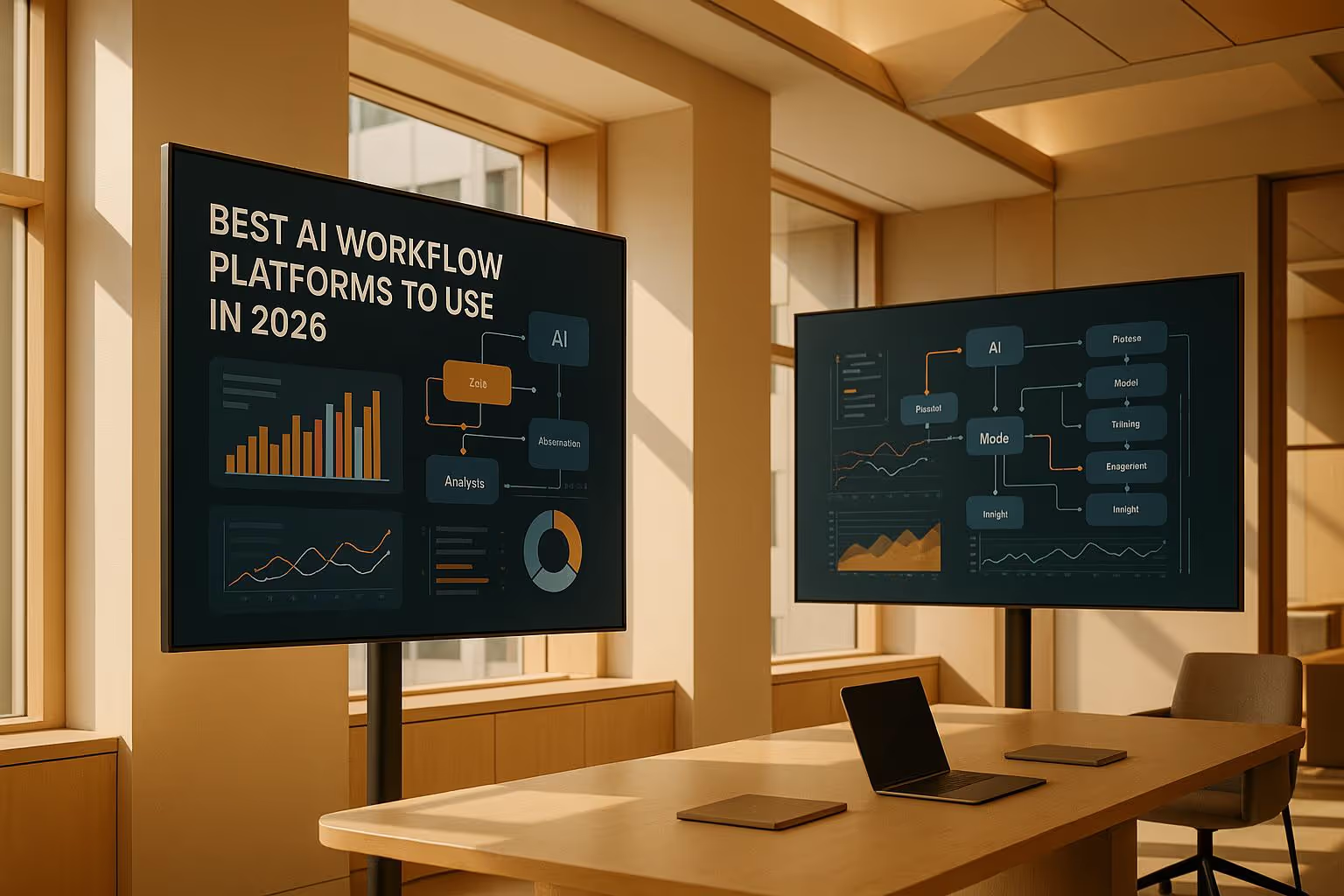
AI workflow platforms are transforming how businesses operate by centralizing access to tools like GPT-5, Claude, and Gemini, cutting costs by up to 98% and boosting productivity by 10x. These platforms address three major challenges: reducing subscription overload, ensuring compliance, and streamlining workflows. Here’s a quick look at the top platforms for 2026:
These platforms simplify AI adoption, enhance governance, and scale seamlessly to meet enterprise needs. Prompts.ai, in particular, stands out for its unified interface and cost-saving capabilities.
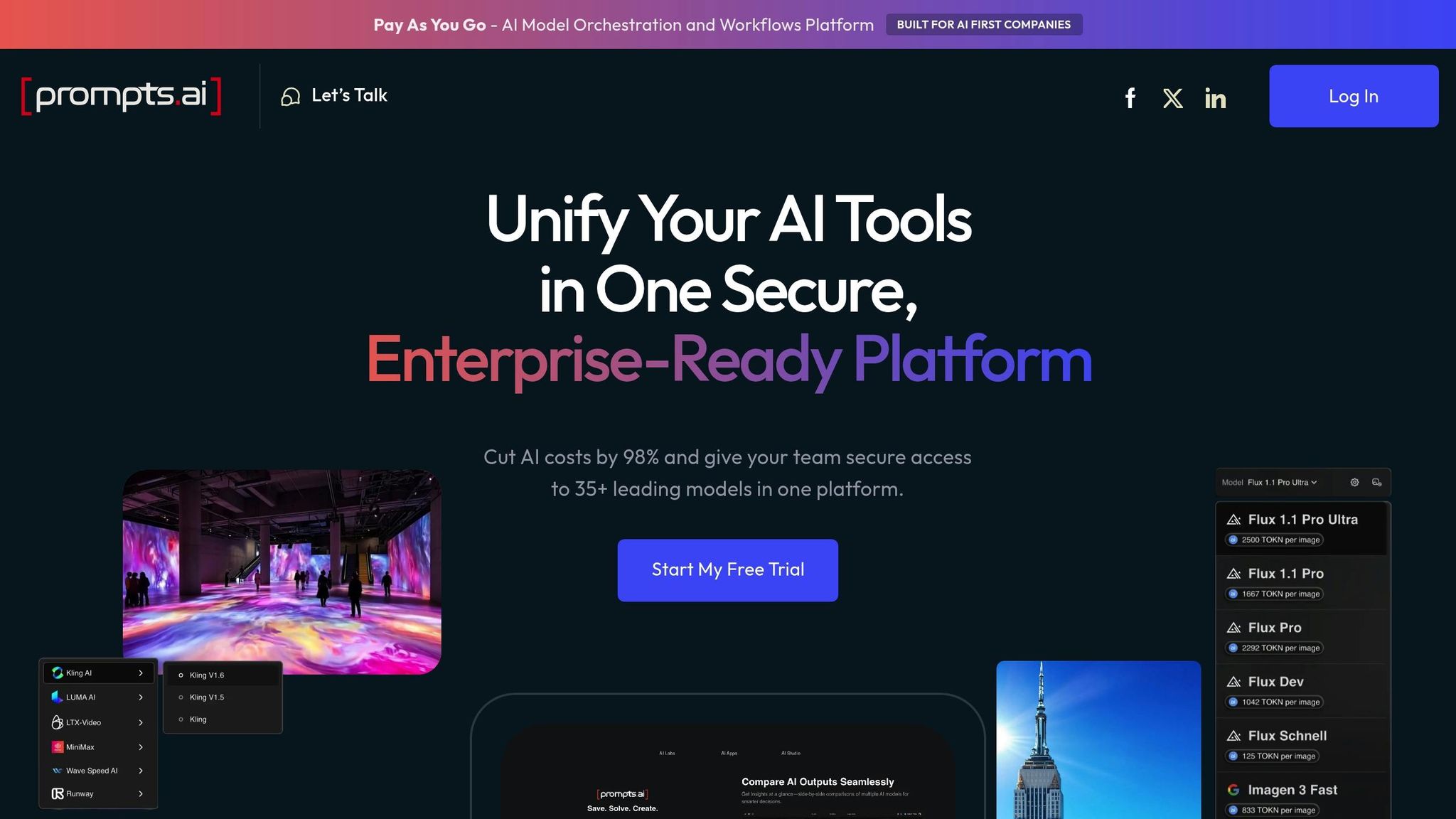
Prompts.ai is an enterprise-focused platform that simplifies AI operations for American businesses, tackling the challenges of scaling AI effectively. Instead of requiring teams to manage multiple subscriptions and interfaces, it consolidates access to 35+ leading LLMs, including GPT-5, Claude, LLaMA, and Gemini, into one secure and unified workspace. This streamlined approach offers a practical solution to the complexities of AI integration.
Prompts.ai excels in connecting diverse LLM providers through APIs, enabling seamless model switching without disrupting workflows. Its multi-step workflow orchestration empowers businesses to link AI processes across models effortlessly. For instance, a marketing team can use a sentiment analysis model to assess customer inquiries and then generate tailored responses with another model - all within a single, structured workflow. This functionality removes technical hurdles, making advanced AI processes accessible even to non-technical teams.
Security is a top priority for Prompts.ai, particularly for American enterprises navigating strict regulatory environments. The platform achieved SOC 2 Type 2 certification on June 19, 2025, reflecting its commitment to robust security standards.
Prompts.ai integrates practices from SOC 2 Type II, HIPAA, and GDPR frameworks, ensuring data protection throughout AI operations. Role-based access controls allow administrators to define user permissions precisely, while detailed audit logs provide the transparency compliance officers need. This makes the platform especially valuable for industries like healthcare and finance, where safeguarding sensitive data is non-negotiable.
Additionally, Prompts.ai partners with Vanta for continuous control monitoring, enhancing its security measures. The platform’s Trust Center offers real-time insights into security policies, controls, and compliance progress, delivering a level of transparency that traditional AI tools often lack.
Prompts.ai addresses the financial challenges of AI adoption with its Pay-As-You-Go TOKN credits system, eliminating fixed subscription fees. Businesses only pay for the AI resources they use, while built-in FinOps tools provide real-time spending visibility across teams and projects. This model is particularly advantageous for organizations with fluctuating AI demands, as it avoids unnecessary costs during slower periods.
Finance teams can monitor expenses down to individual workflows and users, ensuring accurate budget management and avoiding unexpected charges. The platform also highlights cost-saving opportunities, such as switching to more efficient models for specific tasks or optimizing workflow settings to reduce token usage.
Industry data indicates that AI workflow automation adoption is expected to grow by over 30% annually through 2026, with platforms like Prompts.ai reducing manual effort in knowledge work by up to 40%. This operational efficiency not only enhances productivity but also directly translates into financial savings.
Designed to meet the scalability needs of American enterprises, Prompts.ai supports high-throughput, concurrent workflow execution without compromising performance. This ensures smooth AI operations, even as usage scales across large teams and organizations.
The platform’s infrastructure allows for quick onboarding of new models, users, and departments - often within minutes - making it ideal for businesses in dynamic markets. Whether introducing a new AI model or expanding operations to additional teams, Prompts.ai adapts seamlessly without requiring significant reconfiguration.
As AI operations grow, centralized controls and monitoring remain intact, providing businesses with the confidence to scale efficiently and securely. This scalability ensures that organizations, from startups to Fortune 500 companies, can expand their AI capabilities without sacrificing performance or security.
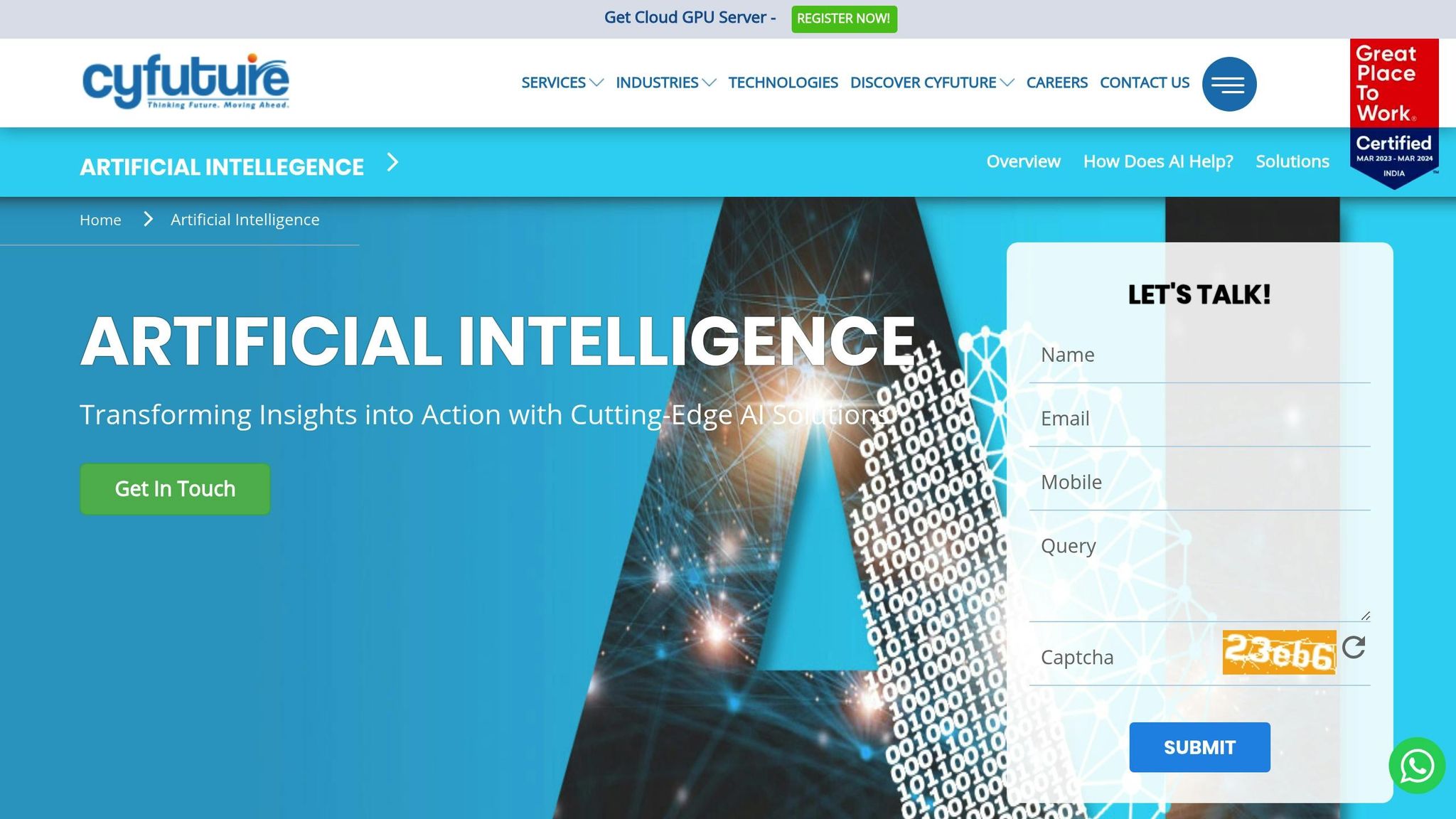
Cyfuture AI is a cloud-based platform built to handle the demands of growing AI operations. Designed with scalability in mind, it’s an ideal choice for U.S. businesses transitioning from small pilot programs to large-scale enterprise AI implementations.
With its cloud-native foundation, Cyfuture AI effortlessly adjusts to the changing needs of businesses. Whether you're testing a small AI project or managing full-scale enterprise automation, the platform dynamically allocates resources to match usage. This flexibility means you can expand workflows without overhauling your infrastructure. And while scalability is a key feature, security remains a top priority throughout.
Cyfuture AI takes security seriously, employing end-to-end encryption for both data storage and transfers. Role-based access controls allow administrators to manage permissions, ensuring only authorized users can access specific workflows, models, or sensitive information. Additionally, detailed audit logs track all user actions and system modifications, providing a clear compliance trail for industries with strict regulations.
The platform operates on a pay-as-you-go pricing model, ensuring you’re charged only for the resources you use. However, because usage can fluctuate, keeping a close eye on consumption is crucial for staying within budget and maintaining cost predictability.

Zapier AI builds on the well-known Zapier automation platform by introducing AI-powered tools that make automating workflows easier for users without technical backgrounds. It integrates AI capabilities directly into existing processes, eliminating the need for coding expertise. By tapping into Zapier's vast app ecosystem, it connects AI tools with thousands of widely-used business applications. This allows users to design advanced, automated workflows through a user-friendly interface. With this setup, teams across various departments - such as marketing, sales, customer service, and operations - can easily incorporate AI into their daily tasks. Up next, we’ll take a closer look at how Make handles AI workflow automation.
Make takes a visually intuitive approach to automating AI workflows, making it accessible even for those without coding experience. This platform allows users to design and implement AI-driven processes through a straightforward, drag-and-drop interface. While specifics on its AI model integration, security measures, cost efficiency, and scalability aren't provided here, you can consult its official documentation for more detailed insights.
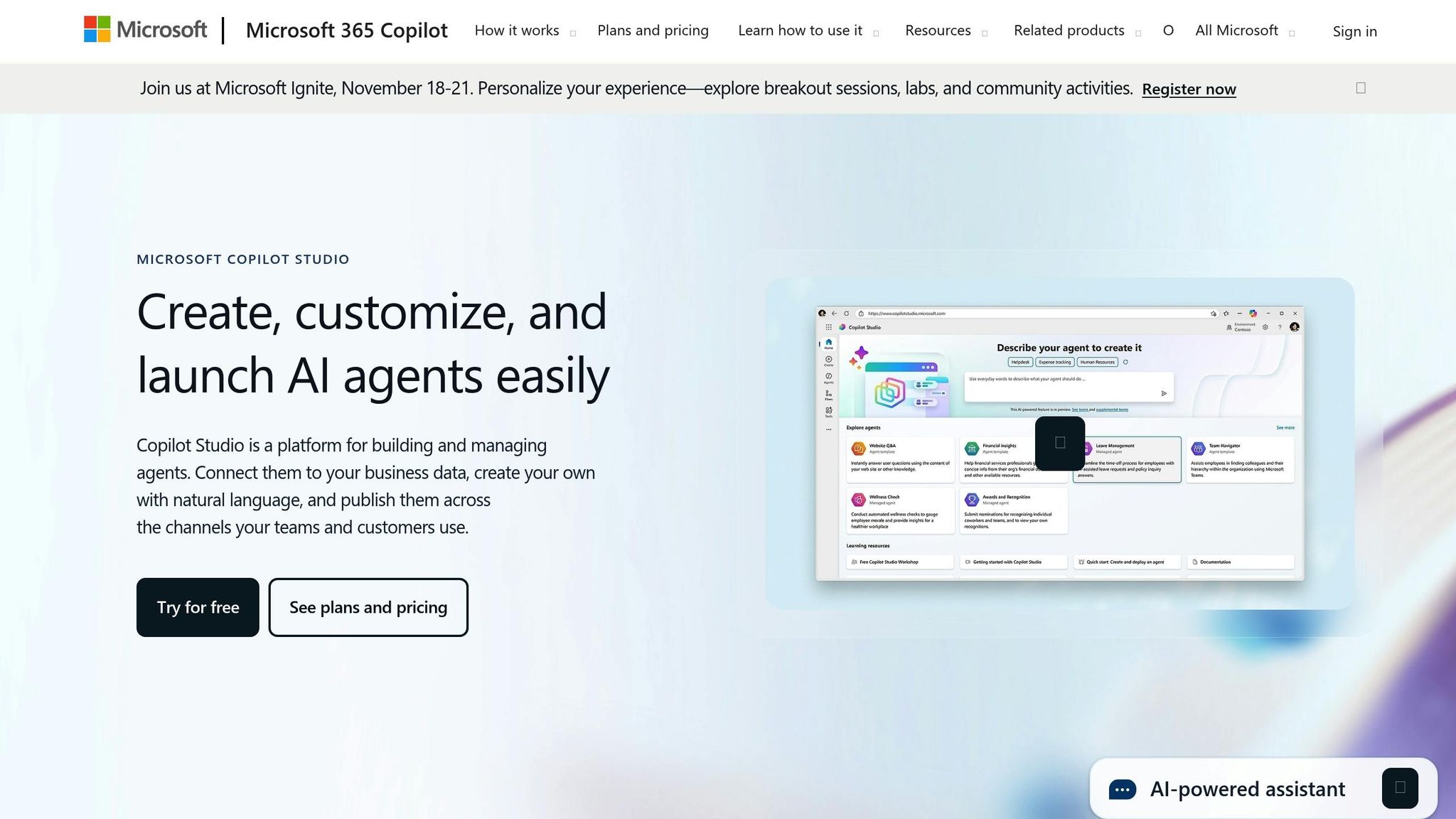
Microsoft Copilot Studio and Power Automate simplify AI-driven workflow automation by leveraging advanced frameworks and integrating effortlessly with enterprise systems.
Microsoft employs two standout technologies to incorporate large language models into workflows:
"AutoGen is built for multi-agent conversations. It uses a 'GroupChat' abstraction to coordinate multiple LLM agents working together. If your use case includes planning, reasoning, or tool-use delegation, AutoGen's loop structure is worth exploring." - Orchestra
AutoGen is particularly effective for coordinating tasks that require sequential reasoning or collaboration among multiple agents.
For more comprehensive integration with enterprise systems, Microsoft offers the Semantic Kernel:
"Semantic Kernel is a strong choice for enterprise-grade copilots with tight integration into business applications." - Orchestra
This framework is tailored to create copilots that seamlessly connect with business applications and data sources. It provides the flexibility needed for organizations to evolve their AI workflows as demands shift, ensuring smooth and scalable operations.
Powered by Microsoft Azure, Copilot Studio and Power Automate are built to manage increasing demands for workflow automation, offering robust performance as businesses grow.
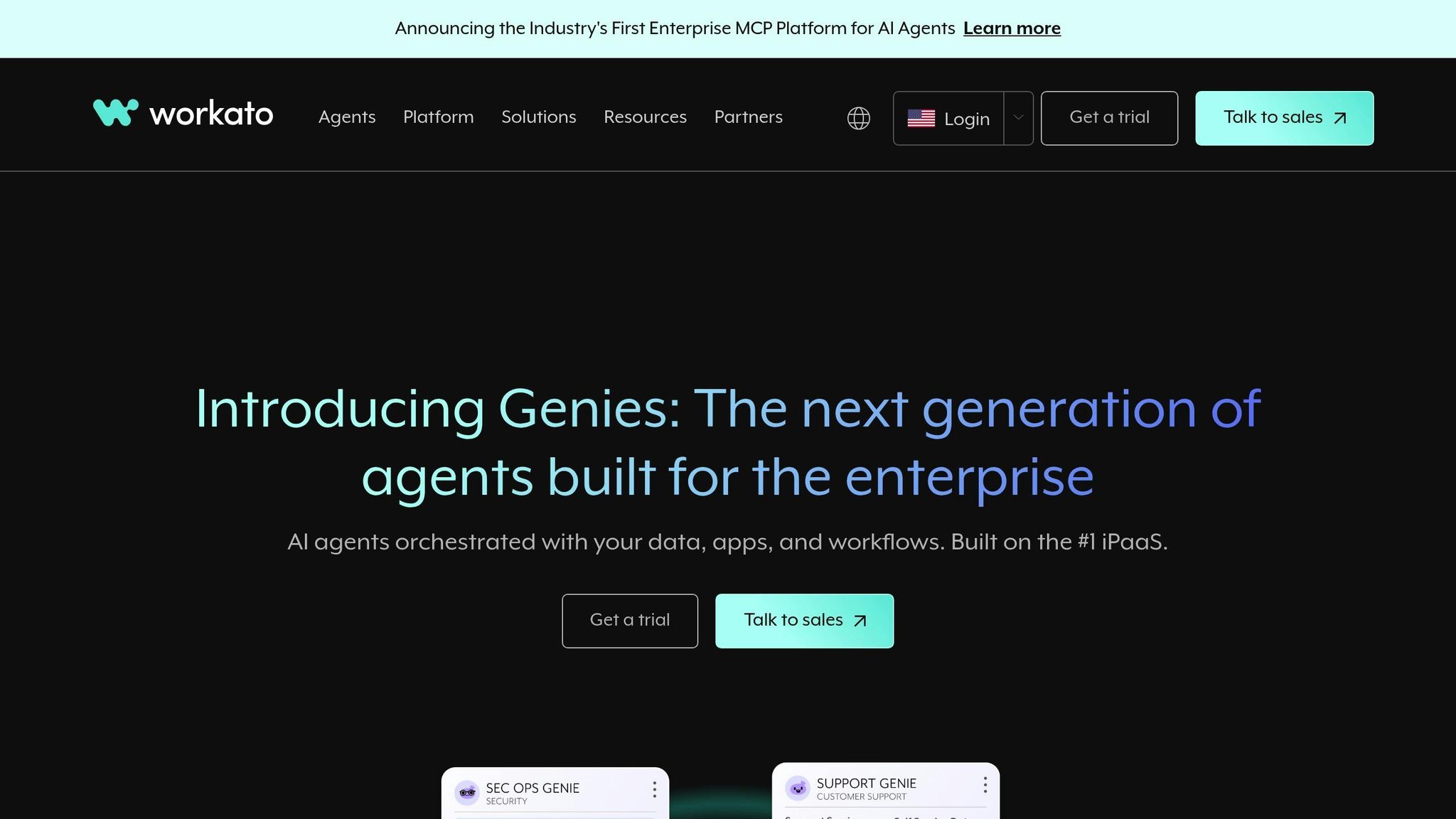
Workato continues to emphasize secure and scalable AI orchestration, setting itself apart with its rigorous governance standards and integration capabilities. As an integration platform, it prioritizes a security-first approach while seamlessly automating workflows. Operating across regions like the US, EMEA, and APAC, Workato treats AI as an integral part of business operations, ensuring strict oversight and control at every step.
Workato integrates large language models with a focus on structured, well-planned implementation rather than piecemeal solutions. Its approach includes safeguards like structured prompts, context-aware processing, and human oversight for tasks with higher risks. This structured methodology not only enhances operational efficiency but also establishes a strong foundation for the platform's security measures.
Workato's security framework is designed with precision, assigning each AI agent a unique identity equipped with scoped access and traceable actions. It adheres to the principle of least privilege, ensuring that agents only have access to what’s necessary. Comprehensive audit logs track every action from initiation to execution, providing full transparency. The platform also employs Enterprise Key Management (EKM) for encryption control, giving users greater authority over their data security.
The Safe AI Governance Framework ensures AI actions are secure, explainable, and well-regulated. Additionally, user data is never used for AI model training, and all data processing occurs within the same region as its originating data center - whether in the US, EMEA, or APAC.
| Compliance Feature | Capability | AI-Specific Benefit |
|---|---|---|
| AI Agent Governance | Assigns unique identities and limits access | Ensures accountability in AI operations |
| Audit Logging | Tracks actions from trigger to execution | Provides transparency for AI decisions |
| Data Privacy Controls | No AI model training with user data; regional processing | Protects sensitive information in workflows |
| Regulatory Compliance | Adheres to GDPR, HIPAA, EU AI Act | Meets global governance requirements |
Workato’s enterprise architecture supports scalability while maintaining governance and control. Role-based access controls empower users without compromising oversight. Advanced features such as Enterprise Key Management (EKM) allow customers to manage encryption keys through tools like AWS KMS, ensuring robust security while scaling operations efficiently. This balance of flexibility and control mirrors the trends observed in platforms like Prompts.ai and Cyfuture AI.
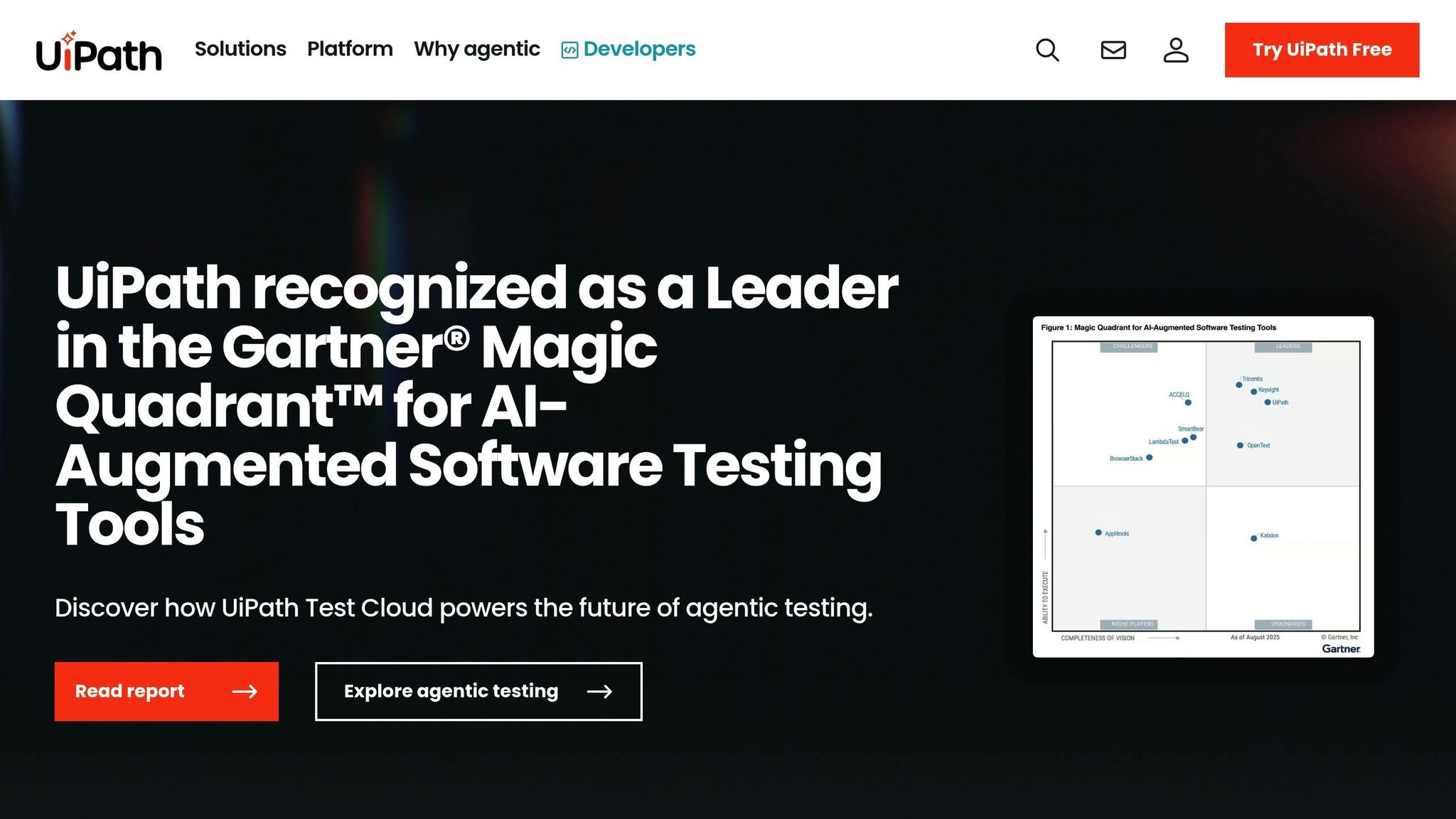
UiPath stands out for its strong focus on security and compliance, making it a reliable choice for safeguarding sensitive data and ensuring workflows adhere to rigorous industry regulations. Its advanced security framework aligns with the growing demand for secure, unified AI workflow solutions.
UiPath employs advanced security protocols to protect workflows and data at every stage. Features like detailed audit trails log every action within a workflow, ensuring traceability and meeting regulatory documentation needs. Data is safeguarded with end-to-end encryption, covering both transit and storage, while role-based access controls (RBAC) enforce strict permissions so only authorized users can make changes or monitor workflows. Additionally, secure credential management protects sensitive authentication details, and real-time anomaly detection allows for quick identification and response to potential threats.
| Security Feature | Implementation | Compliance Benefit |
|---|---|---|
| Audit Trails | Tracks and logs all workflow actions | Fulfills regulatory documentation standards |
| End-to-End Encryption | Secures data and credentials in transit and at rest | Ensures data privacy throughout workflows |
| RBAC Controls | Manages permissions on a granular level | Upholds the principle of least privilege access |
| Anomaly Detection | Monitors and alerts in real time | Enables proactive threat management and compliance |
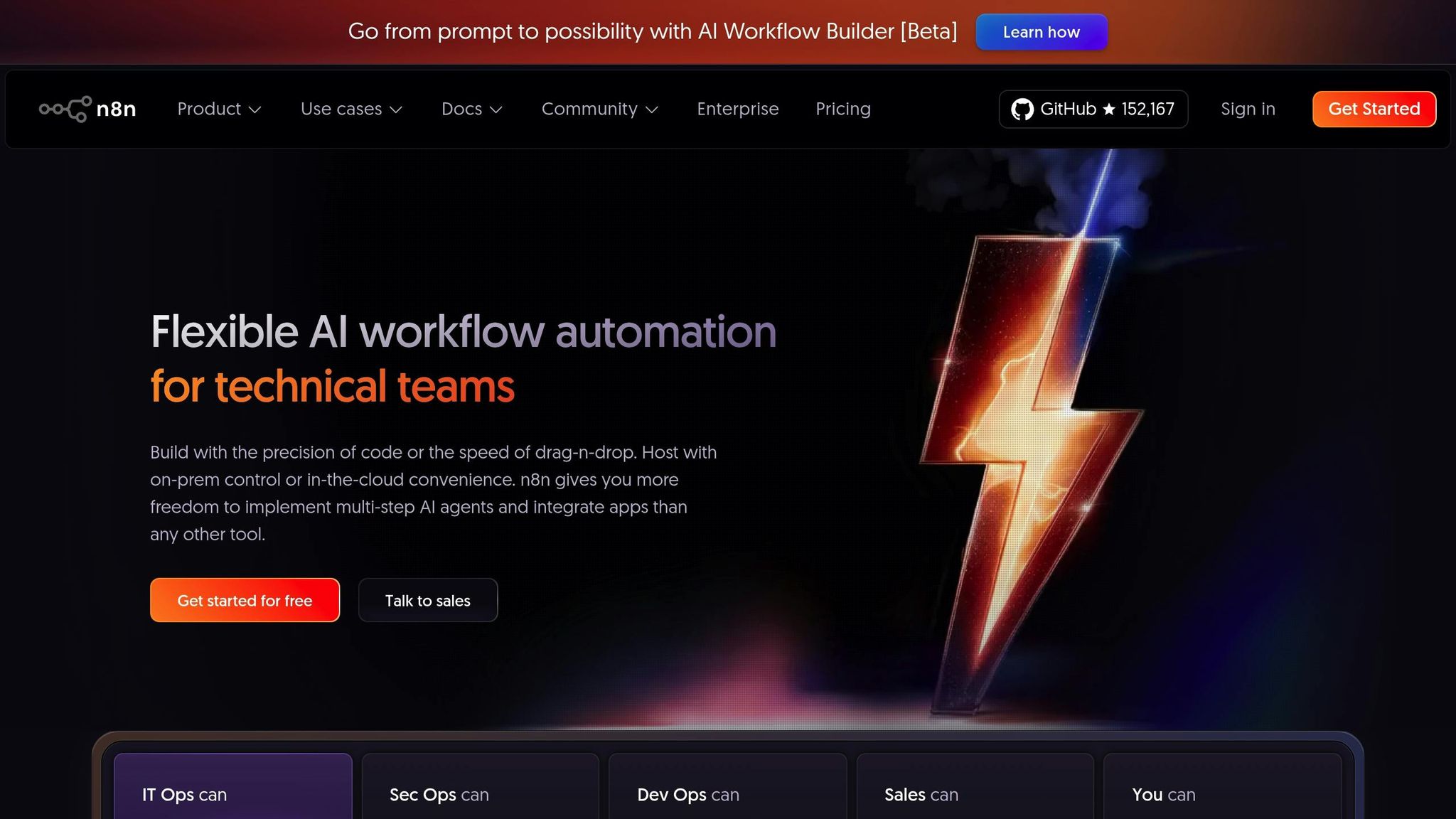
n8n stands out as an open-source solution in the realm of automation platforms, offering a customizable option for creating efficient AI workflows.
With n8n, costs are based on full workflow executions, allowing users to manage expenses effectively even for intricate processes. The platform includes a free tier designed for individuals and small teams, while larger enterprises can explore custom pricing options tailored to their needs.
Thanks to its open-source framework, n8n provides the flexibility needed for scalable deployments, making it adaptable to varying project sizes and requirements.
Selecting the right AI workflow platform involves weighing factors like operations, compliance, and costs. Below is a breakdown of the key strengths and weaknesses that distinguish various platforms.
Data Compliance and Security
Prompts.ai stands out with its enterprise-grade governance and built-in audit trails, ensuring a secure and compliant environment. Other platforms also prioritize robust security, particularly for industries with stringent regulatory requirements.
Pricing Transparency
How pricing is structured can greatly impact budgets. Prompts.ai uses a flexible pay-as-you-go TOKN credit system, which aligns costs directly with usage and helps reduce AI expenses compared to traditional subscription models. On the other hand, many competitors offer subscription-based or custom pricing plans tailored to different usage needs.
Integration Capabilities
The ability to integrate seamlessly with existing business tools is vital for efficient workflow automation. Prompts.ai offers centralized access to over 35 LLMs, simplifying AI orchestration. Other platforms often prioritize either broad third-party app integrations or deep connections with popular productivity tools, making it essential to choose one that complements your current setup.
Scalability and Customization
Different organizations have varying needs for growth and flexibility. Some platforms provide open-source frameworks that offer extensive customization but require technical expertise. Others focus on enterprise-grade scalability with powerful workflow orchestration, catering to both small businesses and large enterprises but sometimes demanding advanced skills for implementation.
Support and Training
Strong support and training can make or break the adoption of a new platform. Prompts.ai provides dedicated onboarding and training services to assist users. In contrast, other platforms may rely on detailed documentation, online training resources, or community-driven support systems.
Performance and Reliability
When it comes to reliability, factors like processing speed, error handling, and uptime are critical. Established platforms generally deliver consistent performance, while newer entrants are still refining their capabilities. Prompts.ai’s unified system reduces potential failure points by consolidating multiple AI integrations into a single streamlined workflow.
Ultimately, the best platform depends on your specific operational priorities and budget. Businesses that prioritize cost efficiency and unified AI access might find Prompts.ai particularly appealing, while those needing extensive integrations or specialized automation features may prefer other options.
| Platform | Best For | Pricing Model | Key Strength | Main Limitation |
|---|---|---|---|---|
| Prompts.ai | Unified AI orchestration for enterprises | Pay-as-you-go TOKN credits | Cost efficiency and access to 35+ LLMs | Evolving ecosystem |
| Cyfuture AI | Cloud-native deployments | Custom enterprise pricing | Advanced cloud integrations | Limited third-party connectors |
| Zapier AI | Small to medium businesses | Subscription-based pricing | Broad third-party app integrations | Can become expensive at scale |
| Make | Visual workflow designers | Tiered subscription | Intuitive drag-and-drop interface | Complex needs require higher-tier plans |
| Microsoft Copilot Studio | Microsoft-centric organizations | Per-user subscription | Strong integration with Microsoft products | Risk of vendor lock-in |
| Workato | Enterprise automation | Custom enterprise pricing | Comprehensive automation features | High implementation complexity |
| UiPath | Process automation and RPA | Custom enterprise pricing | Extensive RPA capabilities | Steep learning curve |
| n8n | Developer-focused teams | Flexible pricing options | Open-source flexibility | Requires technical expertise |
This comparison offers a clear overview of how each platform aligns with diverse business needs and priorities.
Selecting the right AI workflow platform in 2026 hinges on balancing cost efficiency, robust security, and seamless integration. For U.S.-based organizations aiming to streamline AI operations, Prompts.ai offers a solution that tackles key challenges. By consolidating access to over 35 top language models into a single secure interface, it eliminates the chaos of managing disparate tools. Its pay-as-you-go TOKN system ensures that expenses align directly with usage, providing a practical approach to cost management.
The platform’s enterprise-grade security framework is built to meet stringent compliance standards, including SOC 2 Type II, HIPAA, and GDPR, with features like built-in audit trails and governance controls. This combination of cost transparency, security, and operational efficiency positions Prompts.ai as a forward-thinking option for U.S. enterprises navigating the complexities of AI in 2026.
With the rise of autonomous workflows and natural language processing, having access to multiple models and the ability to compare their performance side by side becomes increasingly important. Prompts.ai empowers organizations to optimize AI usage for specific tasks while maintaining real-time usage tracking and comprehensive compliance across all interactions. Its unique ability to scale AI initiatives while keeping costs and security in check makes it a platform that aligns perfectly with the operational needs, budget considerations, and growth ambitions of businesses focused on centralized AI governance and cost-effective solutions.
Prompts.ai places a strong emphasis on data security and regulatory compliance, adhering to SOC 2 Type II, HIPAA, and GDPR standards. These stringent protocols are designed to safeguard the confidentiality, integrity, and availability of user data.
To protect sensitive information, the platform utilizes advanced encryption, conducts regular audits, and enforces strict access controls. By aligning with these widely respected frameworks, Prompts.ai ensures businesses can uphold trust and effortlessly meet compliance obligations.
Prompts.ai offers a Pay-As-You-Go TOKN credits system that lets businesses cut costs by avoiding fixed subscription fees. Instead of being tied to plans with unused features or capacity, you only pay for the credits needed to complete specific tasks.
This approach keeps your spending tied to actual usage, allowing costs to scale naturally with demand. Users have reported savings of up to 95% compared to traditional subscription models, making it a smart and cost-effective choice for managing AI workflows.
Prompts.ai simplifies the process for non-technical teams to manage and optimize workflows by bringing multiple large language models (LLMs) together in one intuitive platform. With this setup, users can easily compare models side by side, selecting the one that best fits their unique requirements - no technical know-how needed.
By streamlining prompt management and automating workflows, Prompts.ai allows teams to save valuable time and concentrate on their core responsibilities. Its centralized interface ensures that advanced AI tools are within reach, enhancing efficiency and minimizing reliance on specialized technical support.


